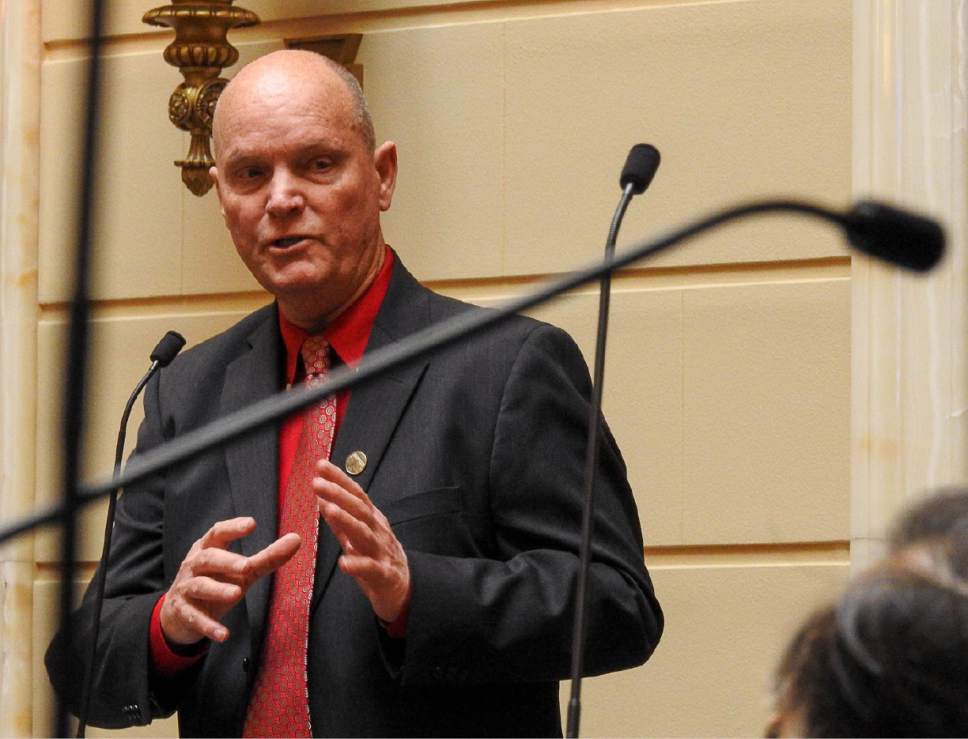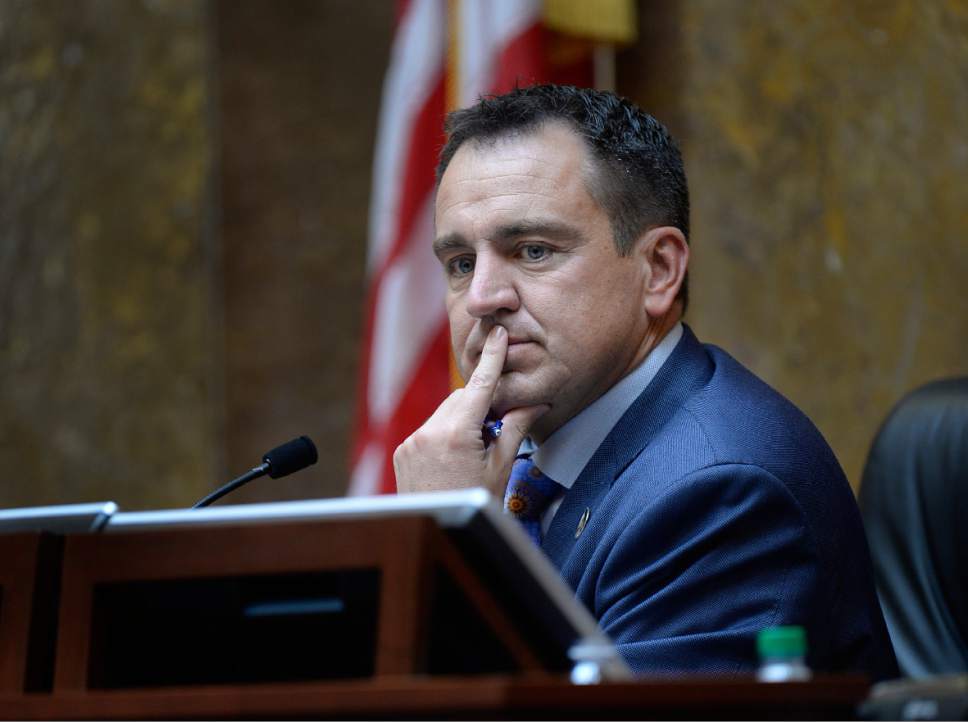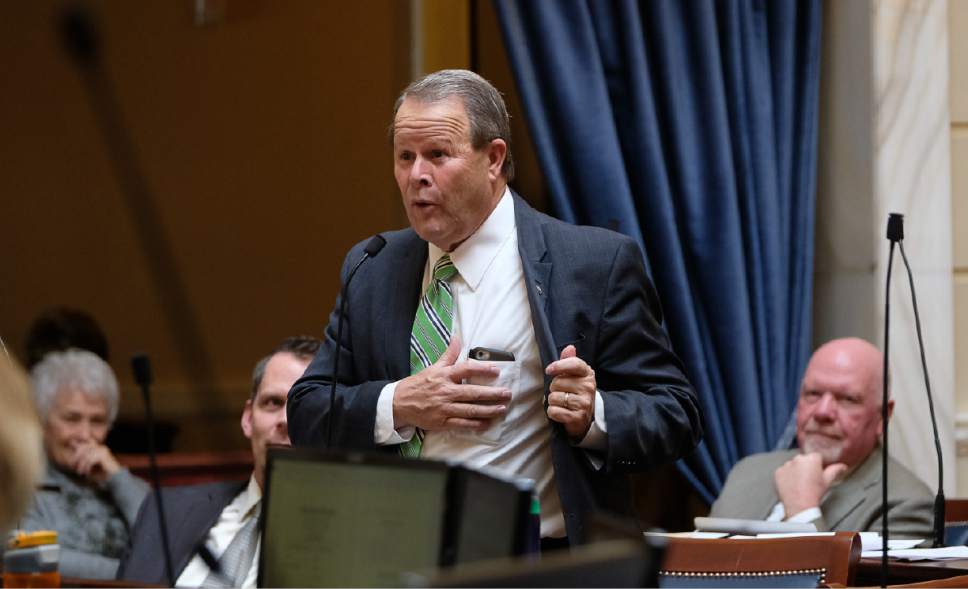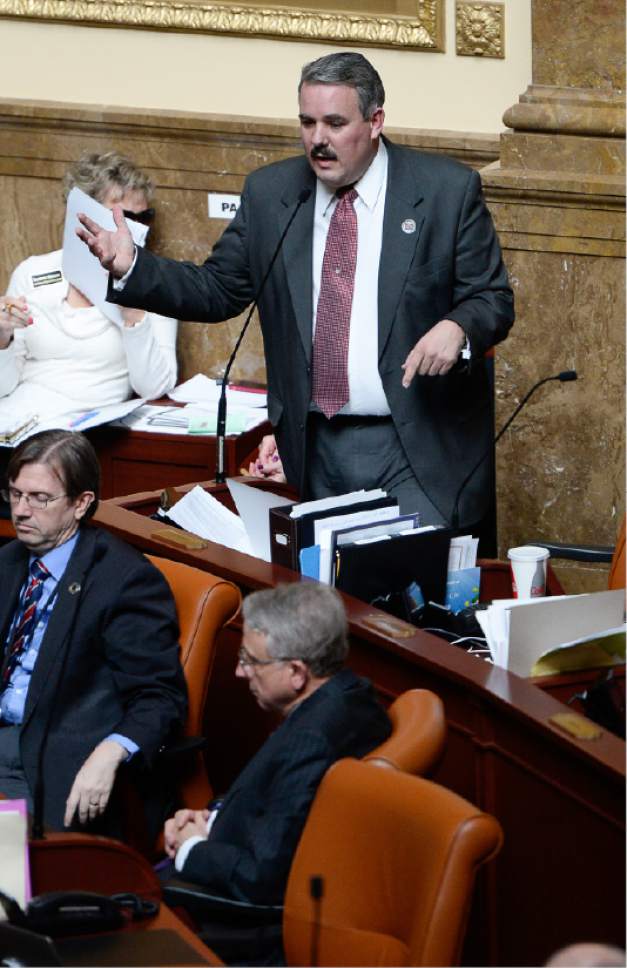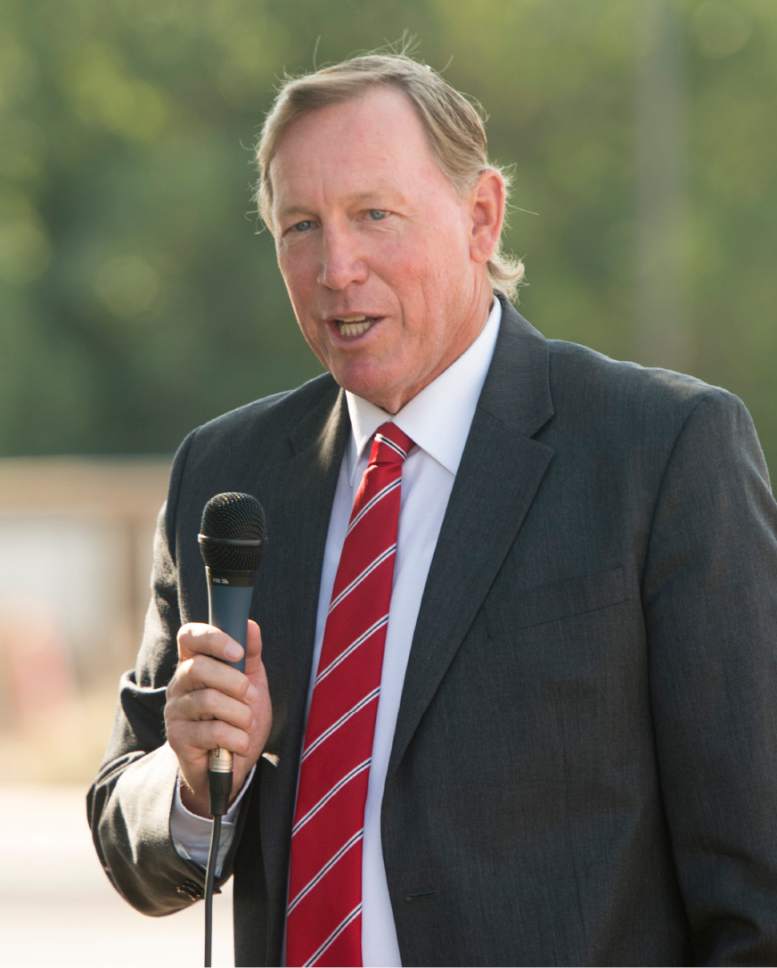This is an archived article that was published on sltrib.com in 2017, and information in the article may be outdated. It is provided only for personal research purposes and may not be reprinted.
Examples are seen every day in the Utah Legislature about how the day jobs and personal interests of Utah's part-time citizen lawmakers affect bills.
Recently two doctors — Reps. Ray Ward, R-Bountiful, and Stewart Barlow, R-Fruit Heights — led different sides fighting over reforming insurance rules to fight opioid overdoses. After an initial stalemate, they worked out a compromise that the House passed 73-1.
Another day, GOP Rep. Lee Perry, a Utah Highway Patrol lieutenant, fought elimination of vehicle inspections in the state — telling horror stories about crashes he saw with uninspected, out-of-state cars. Still, the bill passed 45-29.
Conflicts emerged even on a non-controversial bill to name part of a highway in honor of the Utah National Guard. As Sen. Wayne Harper, R-Taylorsville, made a motion to pass it in committee, he questioned whether he needed to declare a conflict of interest because his son-in-law serves in the guard.
"If you do, then I do," said the committee's chairman, Sen. Gregg Buxton, R-Roy.
It's a common refrain at the Legislature, where one of every four bills this year is sponsored by a lawmaker with a deep professional or personal interest in them, according to a Salt Lake Tribune analysis.
And that's only the bills that they personally sponsor. Lawmakers have conflicts on many other bills, too — and under Utah law they cannot abstain from voting on any of them.
Leaders see this intersection of professional and legislative interests as generally an advantage — allowing lawmakers to utilize special expertise that colleagues offer from a wide variety of professions. They also see the potential for self-dealing, but say they have seen no abuses.
"We feel we've brought a lot of transparency and light" through required conflict of disclosure forms and sometimes-required verbal disclosures to avoid lawmakers helping themselves, says House Speaker Greg Hughes, R-Draper.
Members police each other, Hughes said, and generally look out for whether "the advantage to the lawmaker [in a bill sponsored] would be greater to themselves than the field that they generally are a member of."
Senate Majority Leader Ralph Okerlund, R-Monroe, concurs. "I don't think there's really a lot of opportunity to try to push something that's not in the state's best interest — in other words in their own interest. It's very difficult just because of the process" and lawmakers watching each other.
—
Conflicts? • The Tribune compared conflict-of-interest forms filed this year by Utah's 104 legislators to the bills that had been introduced and numbered through Thursday.
This analysis found that about 27 percent — at least 218 of 799 bills and resolutions — are on topics closely related to their sponsors' day jobs or other personal interests, or those of spouses.
Some examples:
• Rep. Jim Dunnigan, R-Taylorsville, owner of an insurance agency, sponsored four bills dealing with the insurance industry.
In one that pits health insurance companies against doctors, HB395, one doctor complained in a hearing that the bill gives insurance companies everything they want — which is why doctors oppose it. But insurance companies and others said doctors refused to negotiate in good faith on the issue.
• Sen. Lyle Hillyard, R-Logan, an attorney who deals with family law, introduced eight bills related to that or the judiciary.
• Sen. Pete Knudson, R-Brigham City, an orthodontist, introduced "Concurrent Resolution Concerning the Oral Health Care of Utah's At-Risk Populations."
Knudson's House sponsor of that bill is Rep. Marie Poulson, whose husband is on the faculty of the Roseman Dental School.
Poulson also introduced a bill entitled, "Dental Licensing Amendments" — and Knudson is that bill's Senate sponsor.
• Rep. Ed Redd, R-Logan, is a doctor who also works with the local jail and with mental health issues. He introduced 13 bills related to those areas.
• Sen. Brian Shiozawa, R-Cottonwood Heights, is an emergency room doctor and introduced five related bills. One would mandate young adults ages 18 to 20 to wear motorcycle helmets, saying he has seen and treated too many traumatic brain injuries among that age group who do not wear helmets.
• House Minority Leader Brian King, D-Salt Lake City, is a board member of the Utah American Civil Liberties Union. He pushed a bill seeking to erase Utah rules that mirror a Texas law struck down last year by the U.S. Supreme Court as an unconstitutional infringement on a woman's right to an abortion.
In a hearing on the bill — after declaring a potential conflict of interest — King said the ACLU might sue the state to erase the state rule unless lawmakers do it voluntarily. He said his bill would avoid a lawsuit the state almost surely would lose, and likely be forced to pay attorney fees.
• The late husband of Sen. Karen Mayne, D-West Valley City, was president of the Utah AFL-CIO labor union. She introduced seven bills and resolutions related to worker rights and pushing for a requirement of local workers on public projects.
• Rep. Brad Last, R-Hurricane, is a vice president at Dixie State University, and also vice chair of the Legislature's Executive Appropriations Committee. He sponsored this year's budget bill for higher education.
—
Advantages • Legislative leaders see advantages of members sponsoring legislation related to their areas of profession.
"If you have a school teacher get up and explain the weighted pupil unit or special education dollars, there is a frontline perspective that you are hearing," Hughes said.
"If you have law enforcement officers talking about law enforcement, some could call it a conflict — others could call it a perspective."
Hughes adds he has talked to legislators from states with full-time legislatures or that have sessions up to three times as long as the 45-day session in Utah. He said lawmakers there essentially work full-time, which tends to exclude all but the rich, retired or people in businesses heavily affected by state government.
Because of Utah's relatively short session, "You have so many professions that people are involved in. I will argue that provides for a richer and more robust debate. And the perspective lent by those in those fields helps us get to better information and better outcomes — as long as everything is openly disclosed on our website."
Okerlund agrees that potential conflicts from part-timers in so many different professions is outweighed by the wide-ranging expertise they bring.
"I think the greatest advantage to a citizen legislature is any bills we pass, we then have to go home and live with them," he said. "We live with our constituents and hear from them every day. If you go to church or go to the market or basketball game, they hold you accountable."
—
Dangers • Leaders acknowledge the dangers of self-dealing in such a citizen legislature. Hughes said they have tried to protect against that in part with improved online conflict-of-interest forms.
As long as potential conflicts are listed on such forms, members need not verbally disclose again during debate or voting — but Hughes notes that many do anyway.
Leaders also observe that while some professions are heavily represented in the Legislature, none have anywhere near a majority — so others can help ensure against improper self-dealing.
This year's group includes 18 attorneys, the most common profession among them, although not all of them practice law. Fifteen members are business owners or run businesses. Another 15 are current or retired educators.
Health care is well represented: five members are doctors, two are dentists, two are health-care administrators and one is a pharmacist. Real estate-related industries also have several members: five current or former Realtors, four homebuilders or developers and one title insurance professional.
But one area where a large majority does exist without much of check is partisan: Republicans over Democrats — which matters on some bills where they all have conflicts of interest, such as on election law. Republicans hold a 62-13 majority in the House, and 24-5 in the Senate.
Republicans this year — over loud protests from Democrats — forced through a bill that will no longer require partisan diversity on dozens of state boards and commissions. The GOP argued the boards are technical, and membership should not be partisan.
Last year, the Legislature also changed decades-old rules to give themselves majorities on legislative management and audit committees — which traditionally had equal numbers from both parties.
—
Abstentions • Despite so many potential conflicts of interest in a citizen legislature, Utah is among very few states that do not allow legislators to abstain on votes where they have a conflict of interest. If they are present, they must vote.
Without that, you'd see members "ducking votes" on tough issues, Okerlund said, making it difficult to come up with the majority of all members (not just those voting) needed for a bill to pass.
"Having a rule in place that you can't abstain makes you accountable, and you better be darn sure you can justify anything you have a conflict on because people know you" in their home district, and are watching, Okerlund said.
"In some states where abstentions are allowed, there are a lot of people riding the fence," Hughes said. "On the whole, having people vote their conscience with transparency and light about what they work on is probably our best effort."
Three years ago, former Rep. Jim Nielson, R-Bountiful, tried to allow lawmakers to abstain. The House Rules Committee declined to vote on the matter after a hearing on it — amid unspoken but understood opposition from leaders at that time.


